Search Results
Showing results 361 to 380 of 496

Tracking Otters
Source Institutions
This activity (on pages 38-43) has learners simulate the way scientists track and map the movement of otters in the wild using radio trackers.
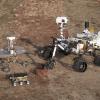
Rover Races
Source Institutions
In this activity, learners experience some of the challenges of "tele-operating" a robotic vehicle on another planet when they design and execute a series of commands to guide a human "rover" through

Pea Brain!: Explorations in Estimation
Source Institutions
In this activity, learners use two different techniques to estimate how many little things fit into one bigger thing.

Using Chemical Change to Identify an Unknown
Source Institutions
In this activity, learners will develop a method to test five similar-looking powders (baking soda, baking powder, cream of tartar, detergent, and cornstarch) with four test liquids (water, vinegar, i

Density Intensity
Source Institutions
In this activity on page 12 of the PDF (Rethinking the 3 R’s: It’s Easy to be Green), learners examine how recyclable materials are separated by various properties at recycling centers.

Building a 3-D Space Maze: Escher Staircase
Source Institutions
In this activity (page 95 of the PDF), learners create Escher Staircase models similar to those that were used by Neurolab's Spatial Orientation Team to investigate the processing of information about
Disappearing Water
Source Institutions
In this outdoor water activity, learners explore evaporation by painting with water and tracing puddles. Learners will discover that wet things become dry as the water evaporates.

Exercise in Creating Drawings for Field Notebooks
Source Institutions
Learners draw and describe a leaf, and then re-find leaves drawn and described by other learners. Learners can observe leaves outside, or leaves may be brought into the classroom.

Supermarket Science: The King Sooper Lab
Source Institutions
In this investigation, learners gather information on various food items during a field trip to a local grocery store.
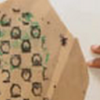
Print Hints
Source Institutions
In this physical sciences activity, learners explore how forensic investigators collect prints from a crime scene. Learners make hand impressions in damp sand and analyze the patterns they observe.
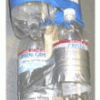
Portable Potable Pressure
Source Institutions
In this activity, learners use plastic water bottles, wood, and water to build an inexpensive and portable tool to demonstrate one atmosphere of pressure at sea level.
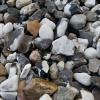
What's the Matter
Source Institutions
In this activity, learners identify different classes of matter based on physical properties.
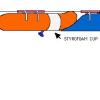
Balloon Staging
Source Institutions
In this activity, learners simulate a multistage rocket launch using party balloons, fishing line, straws, and a plastic cup.
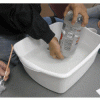
Inflate-a-mole
Source Institutions
In this activity, learners conduct an experiment to find the volume of one mole of gas. Learners capture sublimated gas from dry ice in a ziploc bag and use water displacement to measure its volume.

Suminagashi: Floating Ink Paper Marbling
Source Institutions
In this activity, learners try to float ink on the surface of water to create a pattern and then capture it with absorbent paper.
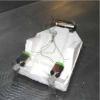
Airboat
Source Institutions
In this activity related to Newton's Laws of Motion, learners build a boat powered by a propeller in the air.

How Small Can You Cut?
Source Institutions
In this lesson, learners cut paper into very small pieces to explore the small size of quarks, the smallest thing we know of on Earth.

Energy Use in the Americas
Source Institutions
Learners explore the relationship between energy consumption, population, and carbon emissions in the countries of the Americas.

Ramps 2: Ramp Builder
Source Institutions
In this inquiry-based learning activity, learners design, build, and test their own ramps. They are introduced to a variety of materials and explore putting them together.

Mass of the Earth
Source Institutions
In this activity, learners use basic measurements of the Earth and pieces of rock and iron to estimate the mass of the Earth.
